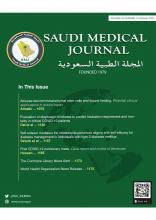Research ArticleOriginal Article
Open Access
Self-esteem mediates the relationship perceived stigma with self-efficacy for diabetes management in individuals with type 2 diabetes mellitus
Ayfer Ozturk, Semih Akin and Necla Kundakci
Saudi Medical Journal October 2022, 43 (10) 1157-1164; DOI: https://doi.org/10.15537/smj.2022.43.10.20220344
Ayfer Ozturk
From the Department of Nursing (Ozturk), Faculty of Health Sciences; from the Vocational School of Health Services Department of Health Care Services Aged Care Program (Kundakci), Vocational School of Health Services, Bartin University, Bartin, and from the Department of Nursing (Akin), Nursing Faculty, University of Health Sciences, Istanbul, Turkey.
PhDSemih Akin
From the Department of Nursing (Ozturk), Faculty of Health Sciences; from the Vocational School of Health Services Department of Health Care Services Aged Care Program (Kundakci), Vocational School of Health Services, Bartin University, Bartin, and from the Department of Nursing (Akin), Nursing Faculty, University of Health Sciences, Istanbul, Turkey.
PhDNecla Kundakci
From the Department of Nursing (Ozturk), Faculty of Health Sciences; from the Vocational School of Health Services Department of Health Care Services Aged Care Program (Kundakci), Vocational School of Health Services, Bartin University, Bartin, and from the Department of Nursing (Akin), Nursing Faculty, University of Health Sciences, Istanbul, Turkey.
MSc
References
- 1.↵International Diabetes Federation. Diabetes atlas 2021 (10th edition). [Updated 2021; accessed 2022 Jan]. Available from: https://diabetesatlas.org/
- 2.↵
- Bahar A,
- Tanrıverdi D.
- 3.↵
- Abdoli S,
- Doosti Irani M,
- Hardy LR,
- Funnell M.
- 4.↵
- 5.↵
- 6.↵
- Can Gür G,
- Yılmaz E.
- 7.↵
- Liu NF,
- Brown AS,
- Folias AE,
- Younge MF,
- Guzman SJ,
- Close KL, et al.
- 8.
- 9.↵
- Browne JL,
- Ventura A,
- Mosely K,
- Speight J.
- 10.↵
- Browne JL,
- Ventura A,
- Mosely K,
- Speight J.
- 11.↵
- Brazeau AS,
- Nakhla M,
- Wright M,
- Panagiotopoulos C,
- Pacaud D,
- Henderson M, et al.
- 12.
- Brazeau AS,
- Nakhla M,
- Wright M,
- Henderson M,
- Panagiotopoulos C,
- Pacaud D, et al.
- 13.↵
- Kato A,
- Fujimaki Y,
- Fujimori S,
- Isogawa A,
- Onishi Y,
- Suzuki R, et al.
- 14.↵
- Lin MH,
- Ou HY,
- Wang RH,
- Lin CH,
- Liao HY,
- Chen HM.
- 15.↵
- Thelan LA,
- Urden LD,
- Lough ME.
- 16.↵
- 17.↵
- Kato A,
- Fujimaki Y,
- Fujimori S,
- Isogawa A,
- Onishi Y,
- Suzuki R, et al.
- 18.↵
- Cohen J.
- 19.↵
- Rosenberg M.
- 20.↵
- Çuhadaroğlu F.
- 21.↵
- Browne JL,
- Ventura AD,
- Mosely K,
- Speight J.
- 22.↵
- Bijl JV,
- Poelgeest-Eeltink AV,
- Shortridge-Baggett L.
- 23.↵
- Usta Yeşilbalkan Ö.
- 24.↵
- Baum A,
- Singer J,
- Valins S
- Baron RM,
- Rodin J.
- 25.↵
- 26.↵
- Mikaeili N,
- Samadifard H.
- 27.↵
- Kenowitz JR,
- Hoogendoorn CJ,
- Commissariat PV,
- Gonzalez JS.
- 28.↵
- Kato A,
- Fujimaki Y,
- Fujimori S,
- Isogawa A,
- Onishi Y,
- Suzuki R, et al.
- 29.↵
- Holmes-Truscott E,
- Browne JL,
- Ventura AD,
- Pouwer F,
- Speight J.
- 30.↵
- Arda Sürücü H,
- Baran Durmaz G,
- Turan E.
- 31.↵Professional Practice Committee. Standards of medical care in diabetes-2018. Diabetes Care 2018; 41: S3.
- 32.↵
- Seo K,
- Song Y.
- 33.↵
- Holmes-Truscott E,
- Ventura AD,
- Thuraisingam S,
- Pouwer F,
- Speight J.
- 34.↵
- Pedrero V,
- Manzi J,
- Alonso LM.
- 35.↵
In this issue
Self-esteem mediates the relationship perceived stigma with self-efficacy for diabetes management in individuals with type 2 diabetes mellitus
Ayfer Ozturk, Semih Akin, Necla Kundakci
Saudi Medical Journal Oct 2022, 43 (10) 1157-1164; DOI: 10.15537/smj.2022.43.10.20220344
Jump to section
Related Articles
- No related articles found.
Cited By...
- No citing articles found.





